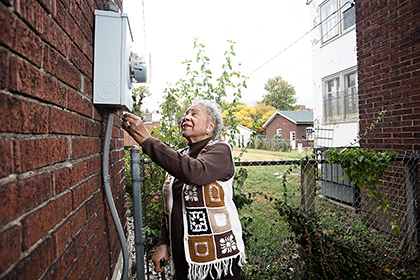AARP Hearing Center

By Tim Poor
When AARP Missouri asked for volunteers to work against three bills in the state legislature that would make it easier for utility companies to impose extra charges on consumers, Carlene Davis didn’t hesitate.
Davis, 80, a retired elementary school teacher in St. Louis, wrote to her representative, signed a petition and talked to people at her church about the proposals.
“The utilities are already higher than they should be,” said Davis, who helped work against a similar proposal three years ago. “If those bills had passed, it just would have made it worse.”
Volunteers press lawmakers
During this year’s legislative session, Davis and about 60 like-minded AARP volunteers helped scuttle all three proposals, which would have allowed less state review before gas, water and electric companies could hike their rates to raise money to upgrade their plants.
“If they want to improve their infrastructure, they should use their [own] resources to do it,” said Norma Collins, advocacy director for AARP Missouri.
“Consumers shouldn’t have to pay for that without going through the regular rate-making procedures.”
Collins told lawmakers about the effect the bills would have on consumers, including many older people on fixed incomes.
Collins estimated the bills would cost Missouri’s residential and business consumers nearly $300 million more per year.
During the legislative session, she provided volunteers with weekly updates so they could weigh in with their representatives.
AARP Missouri joined other consumer advocates in a coalition called the Fair Energy Rate Action Fund to oppose:
SB 207, to allow the Public Service Commission to approve surcharges sought by electric utilities without going through the normal approval process if the money generated by the surcharge was earmarked to pay for improvements to plants and other infrastructure. Utility executives said the lengthy rate-approval process is antiquated and stalls needed improvements.
The bill died when Republican senators staged a filibuster, citing the effect of a surcharge on older constituents and businesses.
SB 240, a bill to ease the rules for imposing surcharges for natural gas infrastructure improvements. If enacted, the bill also would have allowed utility companies to charge customers extra to make up revenue that was lost when other customers didn’t pay their bills.
Gov. Jay Nixon (D) vetoed the measure, saying, “The harm to consumers from increased gas bills outweighs the legislation’s potential benefits.” Legislators did not attempt to override the veto, and the bill did not become law.
SB 297, to make it easier to raise water rates through surcharges. It was defeated in the Senate by one vote.
Craig Eichelman, AARP Missouri state director, said defeating the utility proposals benefits all consumers, not just people on fixed incomes.
He said the proposals were an attack on the checks and balances provided through the Public Service Commission to ensure that rate increases are justified.
“We do our best as the only consumer group out there that has the resources to intervene in these complicated cases,” he said.
Tim Poor is a writer living in Clayton, Mo.































































